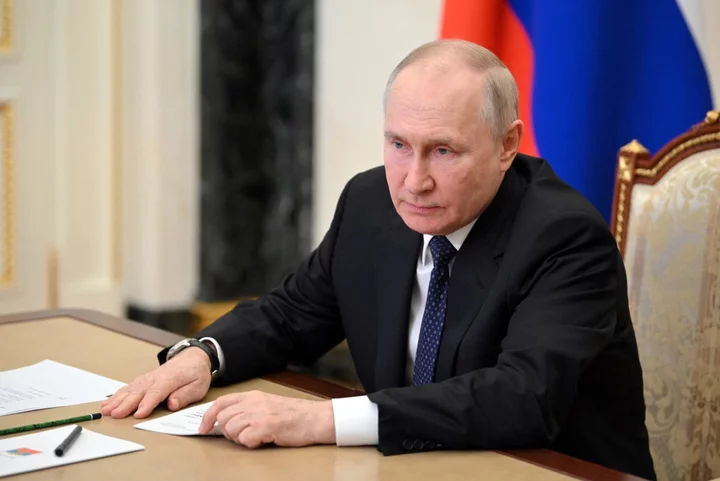Putin signs off law banning Russians from changing gender in latest blow to LGBT+ community
Vladimir Putin has signed a new controversial legislation banning surgical gender reassignment in Russia in yet another blow to the country’s LGBT+ population. Crackdowns against the LGBT+ community and gender minorities in the country have only gathered pace ever since the full-scale invasion of Ukraine last year as the Russian president seeks popularity among citizens. The latest move by Mr Putin on Monday marks Russia’s final step in rendering gender-affirming procedures illegal and depriving its transgender population of their right to access gender-reassignment services. The bill, cleared unanimously by both houses of the Russian parliament and signed by Mr Putin, now bans any “medical interventions aimed at changing the sex of a person” along with changing one’s gender in official documents and public records. Under the bill, exceptions will only be made for a permissible list of medical interventions “related to the treatment of congenital physiological anomalies in children”. The list of these “anomalies in children” will be drawn up by the Kremlin. Couples who transitioned to their new genders after they adopted children will have their marriages annulled. The law thus bans them from becoming foster parents. The regressive legislation has stemmed from the Kremlin’s crusade to protect what it calls are the country’s “traditional values” and according to Russian lawmakers, it is meant as a safeguard against “Western anti-family ideology”. Some lawmakers have dubbed gender transitioning “pure satanism”. State Duma speaker Vyacheslav Volodin said the decision to pass the bill “will protect our citizens and our children” after it was set to undergo its third reading. The bill described gender reassignment as “the path leading to the degeneration of the nation”. The future remains bleak for Russia’s transgender population, which earlier had access to gender-reassignment surgeries and treatments like hormone replacement therapy. A transgender man in Russia, identified as Alexei, said he always had plans to change the gender label on his passport, but is now enduring “hell”. The 23-year-old told The Moscow Times that he is in panic, while stating that the process of his gender transition was already lagging as he was living on his own since he turned 18. He also told the newspaper that he did not have enough money, but will now have to start urgently. Russia ranked 46 out of 49 European nations in advocacy group Rainbow Europe’s annual LGBT+ rights rankings. The country’s politicians are “harming transgender and intersex people by continuing to deploy cynical ‘family values’,” according to Human Rights Watch. Read More Russian president signs legislation marking the final step outlawing gender-affirming procedures The upper house of Russian parliament approves a ban on gender changes Russian lawmakers pass a bill outlawing gender-affirming procedures to protect 'traditional values' Parents take on struggle for trans rights for their kids and others in conservative Poland Spain votes in general election that could see it become latest EU country to veer to the right
Vladimir Putin has signed a new controversial legislation banning surgical gender reassignment in Russia in yet another blow to the country’s LGBT+ population.
Crackdowns against the LGBT+ community and gender minorities in the country have only gathered pace ever since the full-scale invasion of Ukraine last year as the Russian president seeks popularity among citizens.
The latest move by Mr Putin on Monday marks Russia’s final step in rendering gender-affirming procedures illegal and depriving its transgender population of their right to access gender-reassignment services.
The bill, cleared unanimously by both houses of the Russian parliament and signed by Mr Putin, now bans any “medical interventions aimed at changing the sex of a person” along with changing one’s gender in official documents and public records.
Under the bill, exceptions will only be made for a permissible list of medical interventions “related to the treatment of congenital physiological anomalies in children”. The list of these “anomalies in children” will be drawn up by the Kremlin.
Couples who transitioned to their new genders after they adopted children will have their marriages annulled. The law thus bans them from becoming foster parents.
The regressive legislation has stemmed from the Kremlin’s crusade to protect what it calls are the country’s “traditional values” and according to Russian lawmakers, it is meant as a safeguard against “Western anti-family ideology”.
Some lawmakers have dubbed gender transitioning “pure satanism”.
State Duma speaker Vyacheslav Volodin said the decision to pass the bill “will protect our citizens and our children” after it was set to undergo its third reading.
The bill described gender reassignment as “the path leading to the degeneration of the nation”.
The future remains bleak for Russia’s transgender population, which earlier had access to gender-reassignment surgeries and treatments like hormone replacement therapy.
A transgender man in Russia, identified as Alexei, said he always had plans to change the gender label on his passport, but is now enduring “hell”.
The 23-year-old told The Moscow Times that he is in panic, while stating that the process of his gender transition was already lagging as he was living on his own since he turned 18.
He also told the newspaper that he did not have enough money, but will now have to start urgently.
Russia ranked 46 out of 49 European nations in advocacy group Rainbow Europe’s annual LGBT+ rights rankings.
The country’s politicians are “harming transgender and intersex people by continuing to deploy cynical ‘family values’,” according to Human Rights Watch.
Read More
Russian president signs legislation marking the final step outlawing gender-affirming procedures
The upper house of Russian parliament approves a ban on gender changes
Russian lawmakers pass a bill outlawing gender-affirming procedures to protect 'traditional values'
Parents take on struggle for trans rights for their kids and others in conservative Poland
Spain votes in general election that could see it become latest EU country to veer to the right

